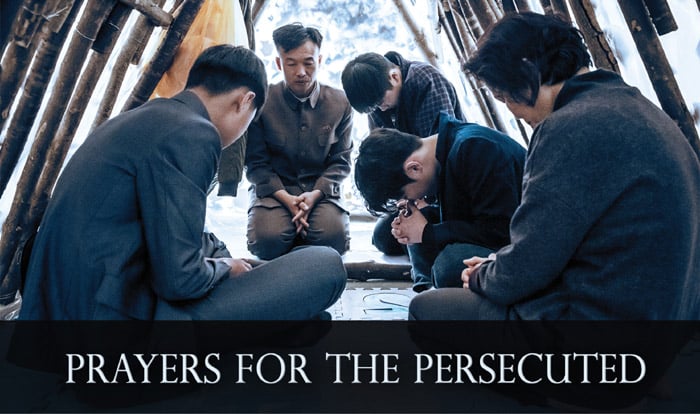
By Matthew Giesbrecht
Each year in November, believers around the world participate in special services that focus on praying for the persecuted church. This year's International Day of Prayer (IDOP) presents us with yet another opportunity to intercede on behalf of the estimated 245 million believers around the world who are experiencing some form of persecution due to their faith.
A noteworthy understanding derived from each year's IDOP services is that the persecuted Christians being represented typically don't request prayer for their persecution to end or be avoided. Rather those being persecuted for the name of Christ make a point of rejoicing in times of suffering, and their prayer requests mainly focus on their country's current affairs and the resulting implications on fellow local believers. Even so, we should keep in mind whenever interceding for the prayer needs of the world's persecuted Christians that some important generic elements ought to be impressed on the hearts of all who pledge allegiance to Christ. This IDOP message attempts to present these needs in what I've called, Prayers for the Persecuted, which are all founded on the hope referenced by the Apostle Paul in 2 Corinthians 1:9-11 (NIVUK):
"Indeed, we felt we had received the sentence of death. But this happened that we might not rely on ourselves but on God, who raises the dead. He has delivered us from such a deadly peril, and He will deliver us again. On Him we have set our hope that He will continue to deliver us, as you help us by your prayers. Then many will give thanks on our behalf for the gracious favour granted us in answer to the prayers of many."
These Prayers for the Persecuted are inclusive, as they apply not only to Christians in persecuted nations, but to all who are committed in faith to Jesus Christ.

1. Praying for "Courage"
Christians in persecuted nations undergo threats to their freedoms, securities and safety. It is while undergoing these threats that apprehension to spread the Gospel becomes the most legitimate. Genuine fears can generate from imminent threats, necessitating a holy boldness empowered by the Holy Spirit and further supported by the dedicated, diligent intercessions of others.
Courageous faithfulness stands firm in the face of opposition -- without cowardice -- demonstrating a fervent zeal when witnessing for the Gospel, despite the outcomes that may follow. When praying for such courage, God is faithful to supply supernatural strength, even in times of weakness.
2. Praying for "Contentment"
Contentment is something that can separate the faithful from the unfaithful. Finding one's joy in the Lord, apart from all else, is a key component to discipleship and an identifier of those belonging to the family of God. It is also one of the most vulnerable positions to be in. Where government powers legislate restrictive laws designed to intimidate citizens who are committed to following Jesus, contentment is a common deficiency among oppressed Christians.
Let's pray our persecuted brothers and sisters will experience Godly contentment -- the overriding joy that's only found in Christ -- motivating His followers to lose sight of all earthly things in order to gain a closer and more meaningful relationship with Him.
3. Praying for "Consolation"
While a misguided pursuit of earthly comfort may take place among those of Western Christendom, an honorable pursuit of intimacy with God -- along with His peace and strength (thanks to the work of the Holy Spirit who consoles the downtrodden) -- is prevalent in the lives of persecuted Christians.
Sometimes those persecuted for their faith are challenged by more aggressive forms of persecution such as imprisonment, exploitation, torture and/or the threat of death. At times, this can cause the human spirit to break, leaving persecuted believers with an acute sense of abandonment in which they begin to doubt God's nearness. These times beckon the prayers of others, in the all-powerful name of Jesus, for His ever-present love and nearness to be felt by those left destitute.
4. Praying for "Compassion"
A key distinction of all Christ-followers is the capacity to love one's enemies. This is beyond any natural human ability, for such compassion can only be derived through the work of the Holy Spirit. Compassion for one's enemies is also lived out in the form of forgiveness; laying down the right to seek vindication and relinquishing the desire to retaliate. In place of retribution, acts of charity are instead administered towards those who have wrongfully afflicted pain and suffering.
Compassion in the face of oppression testifies to the tremendous love of God. Therefore, our fervent prayers for persecuted believers ought to include appeals that they will be empowered to extend compassion, forgiveness and genuine concern to their oppressors.
 5. Praying for "Composure"
5. Praying for "Composure"
Retaining one's composure during persecution undergirds the other mentioned Prayers for the Persecuted. Indeed, having patience to endure and exercising wisdom during suffering serve to further ground persecuted believers, making it possible for them to focus on the still small voice of the Holy Spirit. In that light, intercessors are encouraged to pray more readily on their behalf.
By regularly praying that our persecuted Christian brothers and sisters will remain in line with God's Word, well-grounded in the faith, reliant on His goodness and strength, and confident during extreme struggles, we are also aligning ourselves with His Word as written by the Apostle Paul in 2 Corinthians 1:9-11. For one's hope is ultimately in God alone.
Reflections of the Persecuted: Applying the Prayers
It cannot be stressed enough that praying in this prescribed manner for our persecuted brothers and sisters-in-Christ around the world ought not to be accomplished only once a year. Albeit, an appointed time to pray corporately for the persecuted church is very beneficial, for it awakens every believer to the needs of those who, through their example of steadfastness, encourage us to serve the Lord with utmost devotion. The writer of Hebrews encourages us to "continue to remember those in prison as if you were together with them...and those who are mistreated as if you yourselves were suffering" (Hebrews 13:3). By regularly committing ourselves to pray accordingly, we're uniting with persecuted Christians in their struggles, as well as in their witness.
Reflecting on the experiences of those suffering for Christ whenever praying on their behalf enables us to identify with them and, through God's power, take a portion of those experiences with us. Only then can we truly embody Paul's words in 1 Corinthians 12:26-27: "If one part suffers, every part suffers with it; if one part is honoured, every part rejoices with it. Now you are the body of Christ, and each one of you is a part of it."
Understanding that we are all part of Christ's body of believers allows us to find the same hope in times of trial and suffering. The Prayers for the Persecuted then become more than entreaties for those being mistreated, but also serve as the means for us to transition into followers who are likewise fully submitted to our Lord Jesus Christ. Along with such submission, is the willingness to lay down our personal rights before God when suffering for His sake. As this occurs, we can anticipate the wondrous revelation of His power working through the united prayers of believers here in Canada and around the globe, meeting the needs of those suffering for Jesus' sake, bringing glory to His name, and showing the world that ours is a hope like no other.
For more information about the International Day of Prayer for the persecuted church, please visit our IDOP Information page.
We also invite you to view the video below, The Dangers of Following Jesus Inside the "Hermit Kingdom." Visit this page to download this powerful message for use in your home or church.


